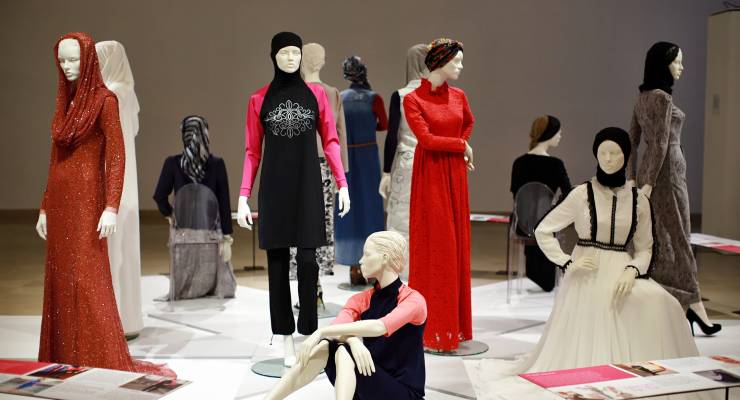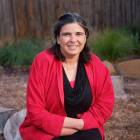
Back in 2007, The Australian’s “Heart of the Nation” marketing campaign provided us with a heartwarming glimpse of all that the newspaper said was best about this country. There at the heart of the heart of the nation was a young woman called Mecca Laa Laa, clad in a red and yellow burquini as she ran into the surf alongside her fellow life guards. That’s Australian.
Not anymore.
Mecca Laa Laa has a central place in the Faith, Fashion, Fusion exhibition that recently ended its Malaysian presentation after touring several Australian cities in the years since it first opened in 2012. This time, however, the national newspaper does not consider her to be an inspirational representation of Australian identity. Rather, it is outraged that DFAT, who sponsers the exhibition, is “spending taxpayers’ money pretending that Islamic dress is part of our cultural identity. It is not and never has been.”
Tony Abbott was also getting his budgie smugglers in a twist over the sponsorship. Where DFAT sees “obvious economic benefits” in targeting the region’s booming market in modest fashion, as well as “a platform to showcase Australia’s diverse, tolerant and multicultural society”, Abbott sees “a very unfortunate readiness to sell out mainstream Australian values”. After all, as the headline in the Daily Mail proclaims, “Australians show their arms and legs when they wear a bikini”.
Oh dear. This particular expression of Australian identity is beginning to sound very … French.
This of course is not the first time that DFAT has attempted to showcase Australia’s tolerance and diversity, only to have Australian politicians and media decide to showcase Australia’s racism and narrow-mindedness instead. See, for example, Yassmin Abdel-Mageid’s visit to the Middle East last year to “promote Australia as an open, innovative and diverse nation”, which according to some commentators was actually a “Sharia apologist’s book tour”.
However, if recent advertising campaigns are anything to go by, more and more corporations are deciding that racism – and Islamophobia in particular – might make for easy political capital, but it is very bad for business. Rising prosperity among Muslim consumers around the world is cited as an incentive for companies and societies to promote themselves in ways that are attractive to this lucrative market.
Alongside modest fashion, halal-certified groceries and sharia-compliant financial services are cited as products that can enhance access to this promising emerging market. The loss of sales to the valuable Muslim consumer market is regularly cited as one of the “costs” of Islamophobia, with reports that the French ban on burqas had led to an exodus of wealthy Arab customers from Paris to London.
Independent modest fashion designers like the ones featured in the Australian exhibition are fast being swamped by Muslim-friendly lines from major brands ranging from Marks and Spencers to H&M. In 2016, a hijab-clad woman featured in PlayBoy as one of “eight men and women who aren’t afraid to break the rules”. Australia’s Ahide Zanetti designed the burquini after not being able to find suitable sportswear for her hijab-observant niece. Now, she can go down to her local sports shop and purchase a Nike Pro Hijab.
In 2015, a Twitter account reportedly linked to ISIS appropriated the famous L’Oreal slogan with a meme showing a young girl in a headscarf next to the line “COVERed girl: Because I’m worth it. The make up giant has now decided that “covered girls” are worth it, last week briefly announcing its first hijab-wearing model, only to have her step aside after now-deleted tweets against the state of Israel were publicised. But someone else will surely take her place in proclaiming the message that headscarf-wearing women still want to have great hair.
When the curators of the Faith, Fusion and Fashion exhibition asked me to write an essay for their book back in 2011 I suggested that they had missed their moment – surely everyone was sick of talking about the hijab? I could not have been more wrong. Plenty of Muslim women do not cover their hair, of course – as I write, Iranian women are under arrest for the defiant removal of their headscarves. But the global modest fashion industry continues to boom, and racism is never out of fashion.








Just when you thought that the Rabid Right’s attention was fully occupied by visions of armies of black ‘thugs’ and citizens cowering under their beds, it’s time for a bit of hijab-bashing. Again. You’d think we live in Poland.
The “obvious economic benefits” of the oppression of women. What fun!
You do a disservice to the brave women of Iran defying religious totalitarianism with this drivel.
Thank you, mademoiselle Craig.
News Ltd logic. Exporting clothes: evil. Exporting guns: oi oi oi.
Apart from the oxymoronic “modest fashion”, this purblind piece of apologia is precisely what one might expect from Ms Hussein.
Shrouding of women has no place on Earth, never mind Australia – it is the most blatant symbol of an ugly, abusive and highly destructive mindset.
All religions can’t be right yet all hold the central view that all others are wrong. Stopped clock?
Yea, AR (whomever you may be), I agree. I saw one of these shrouded women at Melbourne airport yesterday and I felt so, so disheartened for her. Oh, no, wait. It was a catholic nun in full flowing regalia and head wear (not a whisp showing). Oh, that’s right, it’s not just Muslim women who choose to wear such garments.
You are aware that nuns are women who have closed themselves off to the world and typically takes vows of poverty, chastity, and obedience. And here’s the interesting part, they do so through choice!
Meanwhile held the population of Saudi Arabia are forced to live in black bin-liners and the population of numerous other countries force women, very much a part of society, to cover up to various degrees through force of violence or imprisonment.
To conflate the two is disingenuous at best.
Yes, thanks, Craig. In a religion run by men who perpetuate the belief that their ‘God’ only wants men in positions of power and control, and who believe they tell others how to live their lives, while they themselves lead a lonely, abstinent life. Yes, know all about religion. As for Saudi’s, they certainly do have some work to do along with other elements of the Islamic faith to cope with the modern day realities they face. Christianity, and those who practice it, however, may not be the best example given the poor track record they have.
So, on one hand, highest rates of melanoma (alongside NZ) worldwide, and on the other hand, get as naked as you can be to maintain the culture. Sorry, I’m confused, do I slip, slop, slap, or don, cover, avoid. Please, help!
I can help you, Richard. All men and women should wear burqas and the melanoma modesty police can beat us all with their big sticks if any part of us is visible.